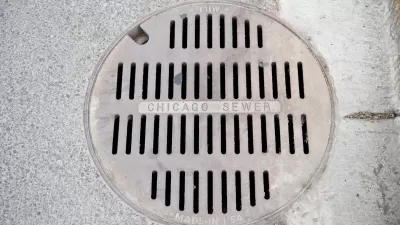Chicago residents living in low-lying parts of the city dread the rainfall that too often brings flooding.

Michael Hawthorne and Morgan Greene report on flooding in Chicago that leaves residents with basements full of water, sewage, and, in some cases, sewer flies. The city’s aging sewer infrastructure cannot handle any sort of rainwater deluge, and the results of the urban flooding have been substantial, write Hawthorne and Greene:
Flood losses in the city and suburbs cost taxpayers $1.8 billion in subsidized grants, loans and insurance payments between 2004 and 2014, according to a report released last month by the National Academy of Sciences. Only hurricane-ravaged areas of coastal Louisiana, New York and Texas received more federal flood aid during the decade.
A number of Chicago neighborhoods are in low-lying areas that make them vulnerable to flooding. "To make matters worse, sewers in Chicago and older suburbs were designed to handle runoff as well as waste from homes and factories. When it rains, the combined sewers quickly fill up, forcing a noxious brew to flow back into basements and out of dozens of overflow pipes into local streams," say Hawthorne and Greene.
Community advocates say the city has been slow to respond, even as it has continued work on the Deep Tunnel, an underground tunnel system designed to handle the runoff that will not be completed until 2029. Some neighborhoods are being proactive and working with organizations like the Center for Neighborhood Technology on strategies to help better manage stormwater drainage.

Maui's Vacation Rental Debate Turns Ugly
Verbal attacks, misinformation campaigns and fistfights plague a high-stakes debate to convert thousands of vacation rentals into long-term housing.

Planetizen Federal Action Tracker
A weekly monitor of how Trump’s orders and actions are impacting planners and planning in America.

In Urban Planning, AI Prompting Could be the New Design Thinking
Creativity has long been key to great urban design. What if we see AI as our new creative partner?

King County Supportive Housing Program Offers Hope for Unhoused Residents
The county is taking a ‘Housing First’ approach that prioritizes getting people into housing, then offering wraparound supportive services.

Researchers Use AI to Get Clearer Picture of US Housing
Analysts are using artificial intelligence to supercharge their research by allowing them to comb through data faster. Though these AI tools can be error prone, they save time and housing researchers are optimistic about the future.

Making Shared Micromobility More Inclusive
Cities and shared mobility system operators can do more to include people with disabilities in planning and operations, per a new report.
Urban Design for Planners 1: Software Tools
This six-course series explores essential urban design concepts using open source software and equips planners with the tools they need to participate fully in the urban design process.
Planning for Universal Design
Learn the tools for implementing Universal Design in planning regulations.
planning NEXT
Appalachian Highlands Housing Partners
Mpact (founded as Rail~Volution)
City of Camden Redevelopment Agency
City of Astoria
City of Portland
City of Laramie





























